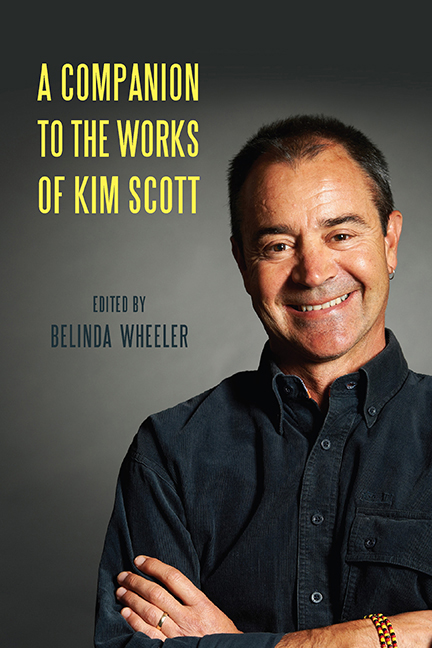Book contents
- Frontmatter
- Contents
- Foreword
- Acknowledgments
- Note on Orthography
- Chronology of Key Writings
- Introduction
- 1 Kim Scott’s Publishing History in Three Contexts: Australian Aboriginal, National, and International
- 2 Kim Scott’s True Country as Aboriginal Bildungsroman
- 3 The Land Holds All Things: Kim Scott’s Benang—A Guide to Postcolonial Spatiality
- 4 Kim Scott’s Kayang and Me: Noongar Identity and Evidence of Connection to Country
- 5 “Wreck/Con/Silly/Nation”: Mimicry, Strategic Essentialism, and the “Friendly Frontier” in Kim Scott’s That Deadman Dance
- 6 The International Reception of Kim Scott’s Works: A Case Study Featuring Benang
- 7 Traumatic Landscapes: Inscribing Spectrality and Identity in Kim Scott’s “A Refreshing Sleep,” “Capture,” and “An Intimate Act”
- 8 Spatial Poetics and the Uses of Ekphrasis in Kim Scott’s “Into the Light” and Other Stories
- 9 The Poetry of Kim Scott
- 10 The Wirlomin Project and Kim Scott: Empowering Regional Narratives in a Globalized World of Literature
- 11 Kim Scott as Boundary Rider: Exploring Possibilities and New Frontiers in Aboriginal Health
- 12 An Interview with Kim Scott
- Notes on the Contributors
- Index
10 - The Wirlomin Project and Kim Scott: Empowering Regional Narratives in a Globalized World of Literature
Published online by Cambridge University Press: 08 May 2021
- Frontmatter
- Contents
- Foreword
- Acknowledgments
- Note on Orthography
- Chronology of Key Writings
- Introduction
- 1 Kim Scott’s Publishing History in Three Contexts: Australian Aboriginal, National, and International
- 2 Kim Scott’s True Country as Aboriginal Bildungsroman
- 3 The Land Holds All Things: Kim Scott’s Benang—A Guide to Postcolonial Spatiality
- 4 Kim Scott’s Kayang and Me: Noongar Identity and Evidence of Connection to Country
- 5 “Wreck/Con/Silly/Nation”: Mimicry, Strategic Essentialism, and the “Friendly Frontier” in Kim Scott’s That Deadman Dance
- 6 The International Reception of Kim Scott’s Works: A Case Study Featuring Benang
- 7 Traumatic Landscapes: Inscribing Spectrality and Identity in Kim Scott’s “A Refreshing Sleep,” “Capture,” and “An Intimate Act”
- 8 Spatial Poetics and the Uses of Ekphrasis in Kim Scott’s “Into the Light” and Other Stories
- 9 The Poetry of Kim Scott
- 10 The Wirlomin Project and Kim Scott: Empowering Regional Narratives in a Globalized World of Literature
- 11 Kim Scott as Boundary Rider: Exploring Possibilities and New Frontiers in Aboriginal Health
- 12 An Interview with Kim Scott
- Notes on the Contributors
- Index
Summary
One group gives its attention, the other gives a story; it's a paradox: empowerment through giving. And it's wise to watch the balance in that exchange.
—Wirlomin Noongar Language and Stories ProjectStories live longer and stronger by being shared.
—Wirlomin Noongar Language and Stories ProjectTHE WIRLOMIN NOONGAR LANGUAGE AND STORIES PROJECT (the Wirlomin Project) works “to claim, control and enhance Noongar heritage” by sharing language and story in a gradual way that fosters an empowered generosity (Mamang, 30; Noongar, 36). As such, they “choose to do this by starting with a small ‘community of descendants’, and progressively sharing with ever widening circles of people” (Mamang, 30; Noongar, 36). This process involves workshopping archival records of Noongar stories told to the American linguist Gerhardt Laves by Noongar “informants” in 1931. These workshops create a discursive relationship between the archive and Noongar Elders to rejuvenate language and story through a variety of narrative forms, “including audio recordings, songs written in Noongar language, visual art and dances created to accompany ancestral stories, a website and additional literature” (Bracknell, “Wal-Walang-Al Ngardanginy,” 3). The choice to share these stories with an “ever-widening circle” of people is most prominently realized by the project's four publications—Mamang (2011), Noongar Mambara Bakitj (2011), Dwoort Baal Kaat (2013), and Yira Boornak Nyininy (2013)— because, as published written texts, they circulate in a globalized literary space. The “appropriate” (“Wirlomin”) sharing of these stories in the literary market creates a tension between what Scott has described as the “homogenising tendencies” of “global discourse” and the possibility for empowered regional storytelling through global systems of exchange (Scott, “Covered,” 124).
The Wirlomin Project's inherent tension between the regional and the global is increased by Kim Scott's involvement in the initiative. Scott's mobility in the world of literature as a successful Noongar author writing in English contrasts with the experiences of the majority of people in his “home community.” In Shaking Hands on the Fringe (2009), Tiffany Shellam cites Jerome Bruner, who observes, “cultures are stable groups working together, but cultures are [also] made up of individuals and so we are autonomous agents as well” (101).
- Type
- Chapter
- Information
- A Companion to the Works of Kim Scott , pp. 130 - 145Publisher: Boydell & BrewerPrint publication year: 2016
- 2
- Cited by



